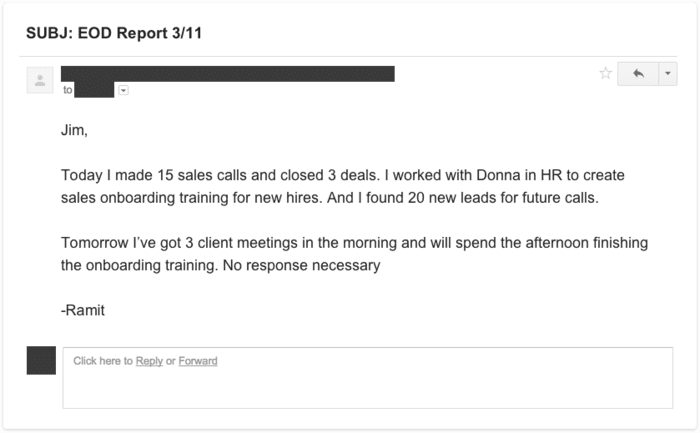Being put on a Performance Improvement Plan (PIP) can feel like a kick to the gut, especially if it feels like it came out of the blue.
However, in most cases, it’s not a surprise. It usually comes after an employee has been struggling in their role or with some other issue at work.
If you’re faced with a PIP and don’t know what to do, don’t panic! Below, you’ll learn how to survive and even thrive during a Performance Improvement Plan.
For those who decide the job’s not right for them, there are also some bonus tips on how to find your dream job if this one doesn’t work out.
Let’s get started on how to respond to a Performance Improvement Plan in the best ways possible.

What is a Performance Improvement Plan (PIP)?
A PIP is a set of objectives given to an employee to help them develop in their role. It’s designed by employers to help their workforce better meet the responsibilities of the job.
In a PIP, employers typically outline what needs to be improved in an employee’s skill set and experience. Later, the employee will be reassessed to see how they’ve improved.
If you’re put on one, keep reading for some tips on how to survive a PIP.
Why Do Managers Use PIPs?
Managers will create PIPs to help employees improve their work, and boost efficiency, and that has a ripple effect across the rest of the business.
It gives clarity to the employees as well, because they know exactly what they need to do to improve and grow.
What to Do If You’re Put on a Performance Improvement Plan
Being put on a plan that tells you how much you need to improve can feel a little soul-crushing. You might be kept up all night thinking, “Am I going to get fired? Should I look for another job?”
Honestly, maybe. It’s entirely possible that the performance review plan is only there to cover your boss legally before they boot you out the door. But before you panic, it’s also just as possible that your company is genuinely invested in you and hopes you hit your goals so they can keep you.
Now, it goes without saying that it’s important to take your PIP seriously. There’s zero wiggle room for mistakes or not hitting the goals laid out for you. If you want to impress and keep your manager happy, here’s how to respond to a PIP.
Don’t Panic
When you’re put on a PIP, panic might be your first response. You may be worried about losing your job, disappointing people, or appearing bad at your job.
There are multiple reasons why someone might be put on a PIP. It might not all be down to you, but instead, it’s about the company taking ownership as well.
Focus on what you can do next and what you can control. It’s important that you respond professionally, as your manager may also be trying to gauge your response.
A PIP doesn’t mean you’re going to be fired. It’s actually a good sign that the company wants to help you improve. Rather than firing you outright, they want to help you develop in your role. So, try to look at it through a more positive lens and take some deep breaths.
Go in with a Positive Attitude
No matter what your employer’s plan is or whether they have another agenda, you should remain calm and professional. Look at it as a way to develop your skills and improve yourself rather than a punishment.
Your attitude will tell your employer a lot. If you are receptive to their suggestions, this is a good sign. If not, then they might think of alternatives that may involve hiring someone else.
Ask for Help
If you know there are areas you’re a little less knowledgeable or experienced in, it’s time to reach out for help. Ask your manager, colleagues, or mentors for advice and guidance.
If you’ve been put on a PIP, there are areas for improvement. So, try to set up weekly check-ins with your manager or ask for feedback from your boss. If you want to get ahead on this, be the first to suggest it. This will show you’re open and dedicated to improving.
Take Charge of Your Progress
If you’re committed to making progress, you need to own it and take the lead. Your manager may be in charge of drawing up the PIP, but it’s up to you to follow through.
Make sure you take a close look through the plan and politely question anything that you need to clear up. You still need to stay on their good side.
Take an active interest in everything being said and try to make suggestions of your own for how you can improve. Everyone could do something to improve, so find out what you could do. Admit it and be open about it.
You could also make suggestions or ask about what the next steps are, whether they’re weekly check-ins or monthly one-to-ones. You want to show that you’re taking this seriously and are committed to progress. This will help ease any doubts the manager has about keeping you on the payroll.
Identify the Reasons
Somewhere along the way, something’s gone wrong. But it’s not always crystal clear what went wrong and when. When you first applied and got the job, you were qualified and experienced for it. So, where’s the gap now?
Did your job role change, but you didn’t get any extra training? Have the manager’s expectations changed, but there hasn’t been an open dialogue about it? Are there circumstances in your personal life affecting your work performance?
Take some time to dig into the reasons leading up to you getting a PIP. This isn’t about finger-pointing and seeing whose fault it is. It’s more about seeing the root cause and retracing your steps. That’ll help you and your managers come to a more informed decision about the next steps.
…but you don’t have to take the same path as everyone else. How would it look if you designed a Rich Life on your own terms? Take our quiz and find out:
Don’t Go the Extra Mile—Go the Extra Inch
Nothing says “I’m taking this seriously” more than doing just a little bit more than everyone else.
I interviewed Pam Slim, author of Escape from Cubicle Nation, about how to become invaluable at your job. She told us a great story of how she went above and beyond to become amazing at her previous job. Here’s what she had to say:
“I would get up really early in the morning and go sit with the traders on the floor. I would see what they did and proactively go to lunch with the most senior people, who were great at giving financial advice and who were really like leaders in the industry. Because I was interested and because I, as the training and development director, wanted to really understand what they did to better serve their employees.”
She went out of her way to take experts and co-workers to lunch to pick their brains, knowing she could learn information that would make her better at her job.
This is a great tactic that I highly recommend. I also suggest checking out books and podcasts by industry leaders so you can learn from their years of experience.
Keep in mind: Becoming great at your job doesn’t have to be drudgery. If you enjoy what you do, then learning how to do it better can be fun! Especially when you know it will make you invaluable to your company (and worth paying more.)
A lot of the time, it’s simple acts like these that help you get ahead. Because, guess what? Most people don’t bother. Taking the time to actively improve your knowledge and experience is exactly the kind of dedication and progress managers want to see.
Answer Questions Before They’re Asked
Imagine you’re at work. You think everything’s going great. But then your boss calls you into their office and starts in on everything you’ve done wrong.
Total nightmare. To avoid this, do what top performers do.
First, be proactive and keep your boss or manager updated on where you’re at with your projects. Don’t wait for them to ask. If you know a question is coming soon, give them the answer before they can get the words out.
For example, you can ask your supervisor if they’d like an “End of Day” report where you briefly tell them what you accomplished and what you have planned for tomorrow. It could look something like this:

An email like this lets your supervisor know you’re on track.
Second, get in the habit of asking for feedback. Ask your boss how things are going from their perspective and what improvements they want to see from you.
Asking for feedback may be uncomfortable at first, but it’s incredibly valuable. Constantly receiving and implementing feedback means you’re getting better at your job every day. This is a skill hiring managers are looking out for, and it’s surprisingly rare to find.
It’s also a great way to show that you’re dedicated to improving things, and managers love to see it, especially when they’ve drawn up a PIP.
Look Elsewhere if Things Don’t Work Out
If you’ve exhausted all of the above and things don’t seem to be improving, there’s another thing you can do: look elsewhere.
You might try your absolute best to rectify things with a PIP, but sometimes there’s only so much you can do. If the job is not the right fit for you, you can look elsewhere, researching new companies that are a better fit. This video below will help you to do just that.
However, it’s still well worth trying to improve and progress in the meantime. It’ll keep your managers happy, and it’s also good to leave on positive terms (especially if you need a referral).
And don’t just go for any old job to replace this one. You could end up right back where you started. Instead, play it smart, do your research like I told you above, and develop a plan to find the right job for you next time.
Keep reading for some more simple pointers on how to do just that.
If Your PIP Doesn’t Work Out: How to Find a Job You Love
Sometimes it just doesn’t work out as we hope. Whether the blame rests entirely on your shoulders, your manager’s, the company’s, or something else, there’s no shame in walking away.
Plenty of people take on jobs and realize months or years later that it’s just not a great fit. Everyone’s been through that at some point.
If you decide that the job is not right for you and you’re likely to see another PIP or even disciplinary action in the future, it might be time to look elsewhere.
Being put on a Performance Improvement Plan doesn’t make you a bad employee. It may be that this job isn’t the right fit for you. And you’re better off finding a job that challenges you and pays better.
The problem is that very few people know how to find a job like that.
People hop on Indeed or LinkedIn, fire off two dozen resumes in a weekend (to jobs we may not even want), then sit back and wait for a reply (which never comes).
Top performers do things differently. They know how to find out exactly what job they want and what company they want to work for. They’ll even send out feelers to friends and co-workers to stay aware of what opportunities are out there.
Top performers have much more clarity on what they want and how they can get there. It’s something that most people struggle with when it comes to the dreaded job hunt.
Here’s an example from Judd W, an IWT reader and graduate of the Dream Job program.
“Last year, I realized I wanted to switch industries. [IWT] helped me focus my search, network with insiders at the company I wanted to work with, take my interview skills to the next level, and, when the offer came in, negotiate what I was worth (over 20% more than the initial offer).”
See? No wasting time on resumes or staring at the computer, feeling lost. Judd followed a proven system for finding and landing a dream job and got tangible results.
If your dream job is one where you can work from the comfort of your home, I have some tips to help you stay productive.
FAQs on How to Survive a Performance Improvement Plan
How long does a PIP last?
The length of a PIP depends on the specific performance issues and the goals set for improvement. It can range from a few weeks to several months.
Can a PIP lead to termination?
In some cases, if an employee does not show improvement or meet the goals set in the PIP, it can lead to termination. However, the primary purpose of a PIP is to provide support and resources for improvement, and termination should always be a last resort.
Should I quit if I get a PIP?
Whether or not to quit if you receive a Performance Improvement Plan (PIP) depends on various factors, including your personal circumstances and the specific details of the PIP.
It is important to carefully evaluate the situation, seek feedback from your supervisor, and understand the potential consequences of quitting versus working towards meeting the performance expectations outlined in the PIP.
In some cases, with effort, improvement, and open communication, it may be possible to successfully address the concerns and move forward in your role.
Is a PIP a disciplinary action?
A PIP is not a disciplinary action, but it is a documented process for addressing performance issues. If an employee does not show improvement or meet the goals set in the PIP, it can lead to disciplinary action or termination.
What are the consequences of PIP?
The consequences of a Performance Improvement Plan (PIP) can vary depending on the organization and the specific circumstances. In general, if the performance issues identified in the PIP are not adequately addressed and improved upon within the specified timeframe, it could lead to further disciplinary action, including termination of employment.
However, successfully meeting the expectations outlined in the PIP can demonstrate improvement and may help in preserving your position and professional reputation.
If you liked this post, you’d LOVE our Ultimate Guide to Getting A Raise
It’s one of the best things we’ve published and totally free—just tell us where to send it:
